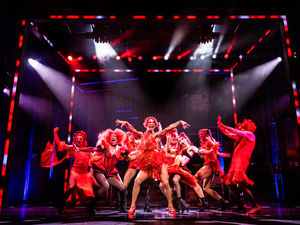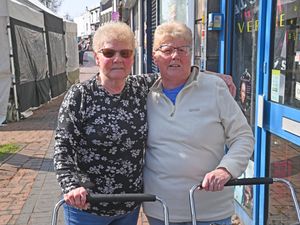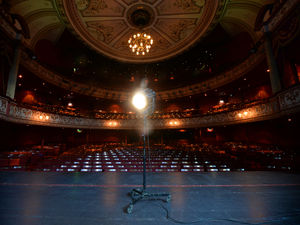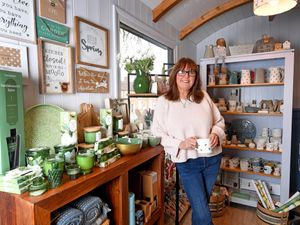Huey’s fun lovin’ life as a rock’n’roll icon
Few rock’n’roll stars have a backstory like Huey Morgan, the founding father of Fun Lovin’ Criminals.
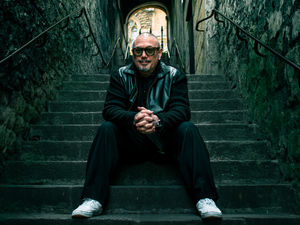
From models to the mean streets of New York’s toughest, from an early life of crime to serving in the US Marines, from successive platinum records to jail terms – Huey Morgan has experienced every twist and turn during one of the most remarkable rock’n’roll life stories of the past 30 years.
He was the guy who sang about crime gang bosses and stick-up jobs – because that’s the life he’d led before becoming a bona fide pop star. He was the dude with a taste for beautiful women, whose notoriety made him a mainstay of the tabloids.
And he was the guy who served his nation’s military, having served time in jail. A judge had told him ‘son you better make a decision’, so he chose the military rather than a lifetime in prison. Martin Scorsese made millions of dollars making movies about guys like him.
Oh yes, and did we mention that he spent his first big pay cheque on a garbage company? And then there was the nightclub, and the pizza bar, and the tattoo studio… Morgan is truly a player whose story makes the fictional characters of The Sopranos look like lightweights.
The creative story is just as remarkable – actually, it’s more. Music and literature flood from a man who sold a million records so that he could spend more time in the studio. Morgan is the OG.
He’s the original whose mother bought him a four-track studio at the age of 12. When he formed the Fun Lovin’ Criminals, it was a fusion of all the music he loved, from Led Zeppelin and Van Halen to the greats of hip hop and jazz, reggae and funk.
His band crashed the top 10 with their first three albums, while also reeling off a string of hit singles, from Scooby Snacks, The Fun Lovin’ Criminal, and King of New York, to I’m Not In Love, Koren Bodega, and Loco.
He wrote books, became one of the nation’s best and best-loved DJs, with a show on 6 Music and with sit-in slots for Jonathan Ross and Dermot O’Leary.
He starred in films, did voice-overs for video games and Lynx deodorant, then settled down with his wife, son, and daughter in rolling West Country countryside.
Wow. And as the rock star enters his 56th year, he’s recording new music for a debut solo album, is about to publish a new book, has recently struck a management deal with the rock industry’s pre-eminent Svengali, Alan McGee, and is hitting the road for his debut spoken word tour – an intimate show that will mix classic stories with acoustic versions of classic songs.
While most rock stars get in a rut, Morgan got into a groove. And it’s a groove that continues to play out following a series of incendiary gigs this summer, as he embarks on a solo career, following his departure from FLC. So let’s start in 1993, the year in which Morgan formed Fun Lovin’ Criminals. He’d left the Marines, with an honourable discharge, and started DJ’ing in New York clubs. He formed a band that would fill in when booked acts failed to show. At a birthday party, he got scouted for EMI.
“We were playing a show at the Limelight Club, in New York. When we finished, this guy came into the dressing room. I remember thinking, ‘Who is this guy?’
“He didn’t look like anyone we would want to hang out with. He had a sweater tied around his shoulders and he handed me a business card. I look down and it says ‘Davitt Sigerson, President and CEO of EMI Records’. I looked back up at him and he asked, ‘Do you want to make a record?’”
Come Find Yourself, the band’s first album, was released in 1996. It was the era of Britpop, a glorious, golden few years in which the alternative became the mainstream.
Morgan’s band were in the right place at the right time and their debut became a top ten hit, securing a platinum disc.
Morgan’s poetic lyrics and laconic drawl set them aside from their peers. From samples of Pulp Fiction to blues-jazz riffs, from James Bond variations to funky rap rhythms, Come Find Yourself was a carnival of sound, one of the most infectious rap records of the year and a suite of songs that reintroduced rap to its bluesy roots.
“The idea came after I got out of the Marines. I wanted to get back into music and had this idea of a three-piece, with me on guitars and vocals, a drummer, and a bass player or keyboard player – but I got lucky and found a guy who could do both.
“I was working with guys who were in bands but didn’t have any direction to knuckle down and do something great. I had the visions. So we started mixing these genres of music together. I’d spent my youth in the ‘70s and ‘80s in Manhattan, doing all types of nefarious things, then I’d travelled the world with the Marines and seen some action. So I had all this life experience and the record became my vehicle for that.
“My youth growing up in NYC shaped me. There was a lot of crazy things happening. Growing up on the Lower East Side of Manhattan was wild, it was one of the craziest neighbourhoods in the history of mankind. That put me on the path I’m on. It was about survival. One of the reasons I’m so amiable is because of that. Back then, you were held to your word. You’d get your ass kicked if you messed up.
“My father left when we were young. So I became the thing that boys become when they don’t have those role models around. The only people I saw that were father figures, or male figures, were street dudes. That’s why I got into the stuff that I did. I realised that was stupid, but that was a little later on.”
The Marines was critical. Morgan entered at a young age and found discipline – the same discipline that he applied to his life in the music business, while others were drifting into the ether, heads full of ideas, but without the rigour to get things done.
So by the time he started Fun Lovin’ Criminals, he’d grown up. He was a year or two older than most of his peers, but he was decades ahead when it came to experience, desire, and determination.
He’d also walked on the wild side. Paradoxically, rock’n’roll was a safe space, compared to what had gone before.
Fun Lovin’ Criminals became popular, really popular. Morgan had given it his best shot – and aced it. He’d become so accomplished as a producer that he was asked to stay at the controls for the band’s debut album, with support from an engineer.
His skills stemmed back to childhood. He’d got undiagnosed ADHD and immersed himself in the minutiae of music. “When I was 12, my mother brought me a port-a-studio, with 4-tracks, like what The Beatles used for Sgt Pepper. I was thinking about producing from an early age. So to produce that debut record was incredible. I had that mentality of the marines – be prepared – and I was ready to do it. I think my mum had realised I really loved music. She knew, objectively, how much it meant to me. She made me jump through some hoops, you know, I had to show I could play guitar before she bought me one. But one of the coolest things my mother ever did for me was support my dreams.
“I looked at music as though it would be my whole life. A bunch of other people in bands look at it as a meal ticket. They see the things that music can bring them. I was different. I didn’t look at what music could give me, I looked at what I could give it.
“I loved that time in the studio. I’d sell a million records just so they’d let me go back and make another record.”
Britpop was a great time to land. The landscape had been populated with weird, Barbie, Eurotrash dance music, then bands who were aping Manchester and The Beatles. The Fun Lovin’ Criminals were unique. They were the ultimate crossover and Huey’s obvious PhD in Cool helped them stand out.
For all of the madness, he stayed true to his roots. So when he received his advance, rather than blowing it on parties, fast cars, or gear, he invested it in a garbage company and paid his rent for a full year. “All these illusions that are dangled in front of you weren’t in the least bit interesting to me.
“That’s one of the reasons I’ve stayed sane and didn’t completely lose my mind. I suffered from a stress disorder and that manifested itself in excessive drinking. But I’ve always been focused.”
Expression
Morgan was a writer and novelist, more than a lyricist. He told stories in his songs, offering the sort of ideas and poetic expression that was missing elsewhere. The songs flowed, and so did the stories.
“I liked to deliver those stories with a little bit of prose. Some words rhymed, but even those elicited more imagery than hit me baby one more time.”
Time waits for no man, of course, and 30 years on, Morgan is going it alone. He’s got a new band, new management, and a new reason to move forward.
“If I had sat down with myself 25 years ago and said ‘write all the things down that you wanted in your life’, my list would have pretty much featured the things that have come about.
“I have a beautiful wife who loves me dearly, two kids who want to hang out with me and think I’m alright, my kids can grow up safely and have a Marine as a dad.
“I am able to make music. I’m 56 years old and about to make a debut solo record on a major label with a huge record producer.
“I don’t think I could ask for more. I’ve signed a book deal. Literally I’m doing everything I could have wanted to do as a kid. It’s been a long and winding road to get here. A lot have hurt me, but they’ve happened for a reason.
“There’s a Danish philosopher who says life isn’t made to make sense when it happens, it’s meant to make sense when you look back. I got a lot of people around me showing me a lot of love so I didn’t know who cared. I’m blessed.”
His intimate evening tour will feature 18 shows and give him the chance to express what’s gone before. He’ll mix music and stories, taking questions from his crowd.
“It’s the best thing. If I’m telling a story about a song, I’ll just lay into that. The audience are looking at it as an experience with me, up close and personal. I’m looking at it as an experience with them.”
It’s time to go. His studio is calling. There are new songs to write and time for one last thought. “I guess it’s quite a story,” he says, as he descends the stairs back into his home studio. It is, Huey, it really is.
n Huey Morgan appears at Bilston Town Hall on October 17 and tickets are available from the venue.
Andy Richardson

